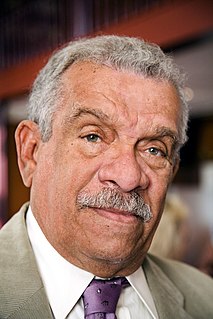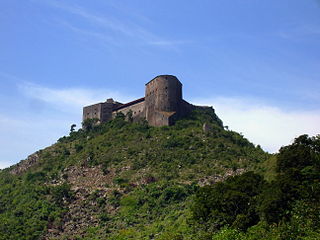Related Research Articles

Sir Derek Alton Walcott was a Saint Lucian poet and playwright. He received the 1992 Nobel Prize in Literature. His works include the Homeric epic poem Omeros (1990), which many critics view "as Walcott's major achievement." In addition to winning the Nobel Prize, Walcott received many literary awards over the course of his career, including an Obie Award in 1971 for his play Dream on Monkey Mountain, a MacArthur Foundation "genius" award, a Royal Society of Literature Award, the Queen's Medal for Poetry, the inaugural OCM Bocas Prize for Caribbean Literature, the 2010 T. S. Eliot Prize for his book of poetry White Egrets and the Griffin Trust For Excellence in Poetry Lifetime Recognition Award in 2015.

Haiti, officially the Republic of Haiti, and formerly known as Hayti, is a country located on the island of Hispaniola in the Greater Antilles archipelago of the Caribbean Sea, to the east of Cuba and Jamaica and south of The Bahamas and the Turks and Caicos Islands. It occupies the western three-eighths of the island which it shares with the Dominican Republic. To its south-west lies the small Navassa Island, which is claimed by Haiti but is disputed as a United States territory under federal administration. Haiti is 27,750 km2 (10,714 sq mi) in size, the third largest country in the Caribbean by area, and has an estimated population of 11.4 million, making it the most populous country in the Caribbean. The capital is Port-au-Prince.

Henri Christophe was a key leader in the Haitian Revolution and the only monarch of the Kingdom of Haiti.

Jean-Jacques Dessalines was a leader of the Haitian Revolution and the first ruler of an independent Haiti under the 1805 constitution. Under Dessalines, Haiti became the first country to permanently abolish slavery. Initially regarded as governor-general, Dessalines was later named Emperor of Haiti as Jacques I (1804–1806) by generals of the Haitian Revolution Army and ruled in that capacity until being assassinated in 1806. He is the father of the nation Haiti.

Alexandre Sabès Pétion was the first president of the Republic of Haiti from 1807 until his death in 1818. He is acknowledged as one of Haiti's founding fathers; a member of the revolutionary quartet that also includes Toussaint Louverture, Jean-Jacques Dessalines, and his later rival Henri Christophe. Regarded as an excellent artilleryman in his early adulthood, Pétion would distinguish himself as an esteemed military commander with experience leading both French and Haitian troops. The 1802 coalition formed by him and Dessalines against French forces led by Charles Leclerc would prove to be a watershed moment in the decade-long conflict, eventually culminating in the decisive Haitian victory at the Battle of Vertières in 1803.

Cap-Haïtien often referred to as Le Cap or Au Cap, is a commune of about 190,000 people on the north coast of Haiti and capital of the department of Nord. Previously named Cap‑Français and Cap‑Henri during the rule of Henri I, it was historically nicknamed the Paris of the Antilles, because of its wealth and sophistication, expressed through its architecture and artistic life. It was an important city during the colonial period, serving as the capital of the French Colony of Saint-Domingue from the city's formal foundation in 1711 until 1770 when the capital was moved to Port-au-Prince. After the Haitian Revolution, it became the capital of the Kingdom of Haiti under King Henri I until 1820.

Nord is one of the ten departments of Haiti. It has an area of 2,114.91 km2 (816.57 sq mi) and a population of 1,067,177 (2015). Its capital is Cap-Haïtien.

The Citadelle Laferrière or, Citadelle Henri Christophe, or simply the Citadelle, is a large early 19th-century fortress situated on the Bonnet à l'Evêque mountaintop in Nord, Haiti. The imposing structure is located approximately 27 kilometres (17 mi) south of the city of Cap-Haïtien, 15 kilometres (9.3 mi) southwest of the Three Bays Protected Area, and 8 kilometres (5.0 mi) uphill from the town of Milot. Commissioned by Haitian revolutionary Henri Christophe, and built by tens of thousands of former slaves, the Citadelle was the linchpin of the newly independent Haiti's defensive strategy against potential French incursion.

The Palace of Sans-Souci, or Sans-Souci Palace, was the principal royal residence of Henry I, King of Haiti, better known as Henri Christophe. It is located in the town of Milot, approximately five kilometres (3 mi) northeast of the Citadelle Laferrière, and thirteen kilometres (8 mi) southwest of the Three Bays Protected Area.
Pompée Valentin Vastey, or Pompée Valentin, Baron de Vastey, was a Haitian writer, educator, and politician. Vastey was what people at the time called a "mulatto," because he was born to a white French father and a black Haitian mother. He served as secretary to King Henri Christophe and tutor to Christophe's son, Victor Henri. Vastey also claimed to have fought in Toussaint's army and is said to have been the second cousin of the French novelist and playwright Alexandre Dumas. Vastey is best known for his essays on the history and contemporary circumstances of Haiti.

Jacques-Victor Henry,Prince Royal of Haiti was the heir apparent to the throne of the Kingdom of Haiti.

The Kingdom of Haiti was the state established by Henri Christophe on 28 March 1811 when he proclaimed himself King Henri I after having previously ruled as president of the State of Haiti, in the northern part of the country. This was Haiti's second attempt at monarchical rule, as Jean-Jacques Dessalines had previously ruled over the First Empire of Haiti as Emperor Jacques I from 1804 until his assassination in 1806.

The State of Haiti was the name of the state in northern Haiti. It was created on 17 October 1806 following the assassination of Emperor Jacques I and the overthrow of the First Empire of Haiti. The northern State of Haiti was ruled by Henri Christophe originally as Provisional Chief of the Haitian Government from 17 October 1806 until 17 February 1807 when he became President of the State of Haiti. The 1807 constitution for the State of Haiti made the post of president a position for life with the president having the power to appoint his successor. On 28 March 1811 President Henri was proclaimed King Henri I, thereby dissolving the State of Haiti and creating the Kingdom of Haiti.

The First Empire of Haiti, officially known as the Empire of Haiti, was an elective monarchy in North America. Haiti was controlled by France before declaring independence on 1 January 1804. The Governor-General of Haiti, Jean-Jacques Dessalines, created the empire on 22 September 1804. After being proclaimed emperor by the Generals of the Haitian Revolution Army, he held his coronation ceremony on 6 October and took the name Jacques I. The constitution of 20 May 1805, set out the way the empire was to be governed, with the country split into six military divisions. The general of each division corresponded directly with the emperor or the general in chief appointed by the emperor. The constitution also set out the succession to the throne, with the crown being elective and the reigning emperor having the power to appoint his successor. The constitution also banned white people, with the exception of naturalised Germans and Poles, from owning property inside the empire.
Harry Dernier: A Play for Radio Production is a play by Derek Walcott, who won the Nobel Prize for Literature in 1992. It was first published in 1952. A play about the last man on earth, and his decision about whether to draw out his life or end it, it has been described as more vernacular than his previous work, but "still literary in style and highly metaphysical in tone", and has drawn comparison to T. S. Eliot's The Waste Land. Written when he was sixteen years old, Harry Dernier was the earliest-written of Walcott's early plays to be staged, in 1952, when he was 22, though his later play Henri Christophe: A Chronicle in Seven Scenes, written at age 19, was also staged in 1952 and was regarded by Walcott as his first play.

The 1804 Haiti massacre, was an event that involved the execution of the remaining French troops and settlers in Haiti at the end of the Haitian Revolution, by soldiers, mostly former slaves, under orders from Jean-Jacques Dessalines.

The Republic of Haiti from 1820 to 1849 was effectively a continuation of the first Republic of Haiti that had been in control of the south of what is now Haiti since 1806. This period of Haitian history commenced with the fall of the Kingdom of Haiti in the north and the reunification of Haiti in 1820 under Jean-Pierre Boyer. This period also encompassed Haitian occupation of Santo Domingo from 1822 to 1844 creating a unified political entity on the island of Hispaniola. Although termed a republic, this period of was dominated by Boyer's authoritarian rule as president-for-life until 1843. The first Republic of Haiti ended in 1849 when president Faustin Soulouque declared himself emperor, thus beginning the Second Empire of Haiti.

The first Republic of Haiti controlled the southern portions of Haiti from 1806 until 1820. The republic, commonly referred to as South Haiti during its existence, was created on 17 October 1806, following the assassination of Emperor Jacques I and the overthrow of the First Empire of Haiti. The southern Republic of Haiti was ruled by General Alexandre Pétion, a free person of color, as President from 9 March 1807 until his death on 29 March 1818. He was succeeded by Jean-Pierre Boyer.
References
- ↑ "Derek Walcott", Poetry Foundation
- ↑ Doris Lorraine Garraway (2008). Tree of Liberty: Cultural Legacies of the Haitian Revolution in the Atlantic World. University of Virginia Press. ISBN 978-0-8139-2686-5.
- ↑ Paul Breslin (2001). Nobody's Nation: Reading Derek Walcott. University of Chicago Press. ISBN 978-0-226-07427-6.
- ↑ Peter O. Stummer; Christopher Balme, eds. (1996). Fusion of cultures?. Rodopi. ISBN 978-90-420-0043-8.